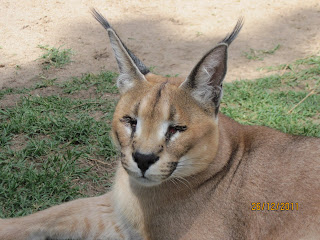As the days have gone on, I’ve found a sort of rhythm to my days. After getting myself together each morning, I head over to Marieta’s garden area and feed the two macaws and the African gray parrot some peanuts (I’ve trained them to come to me when I yell, “Peanuts!” and the parrot will even perform a bit for me by saying “hello!”)
Then I take a couple more peanuts (yes, I brought them with me) to Audrey, the blind vervet monkey, who is a whopping 22 years old—practically unheard of, but true. She comes out of her little house when I tell her I’m there with her morning treat, pats her hands on mine until she finds my fist, and then unwraps my fingers one by one to get to the peanut. She’ll often touch my hands between bites to make sure I’m still there. (And her cage mate, a squirrel named Fred, comes over and takes his nut out of my hand, too.)
After I slip a couple more peanuts to the monkeys in the cage next door (they always look on with their big soulful eyes and beg), I move over to the garden area that houses Atheno the cheetah cub. I spend a few minutes brushing his coat and scratching him wh
After some more cuddling (if I can get him to calm down long enough to let me), I’m off to gather up Pickles where I’ve left her by the outside gate, and then she and I head off to get some breakfast. I can’t think of a better morning routine—not ordinary, by any stretch of the imagination, but certainly joyful.






